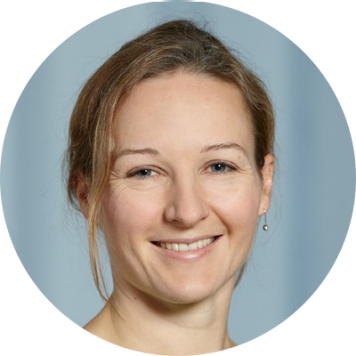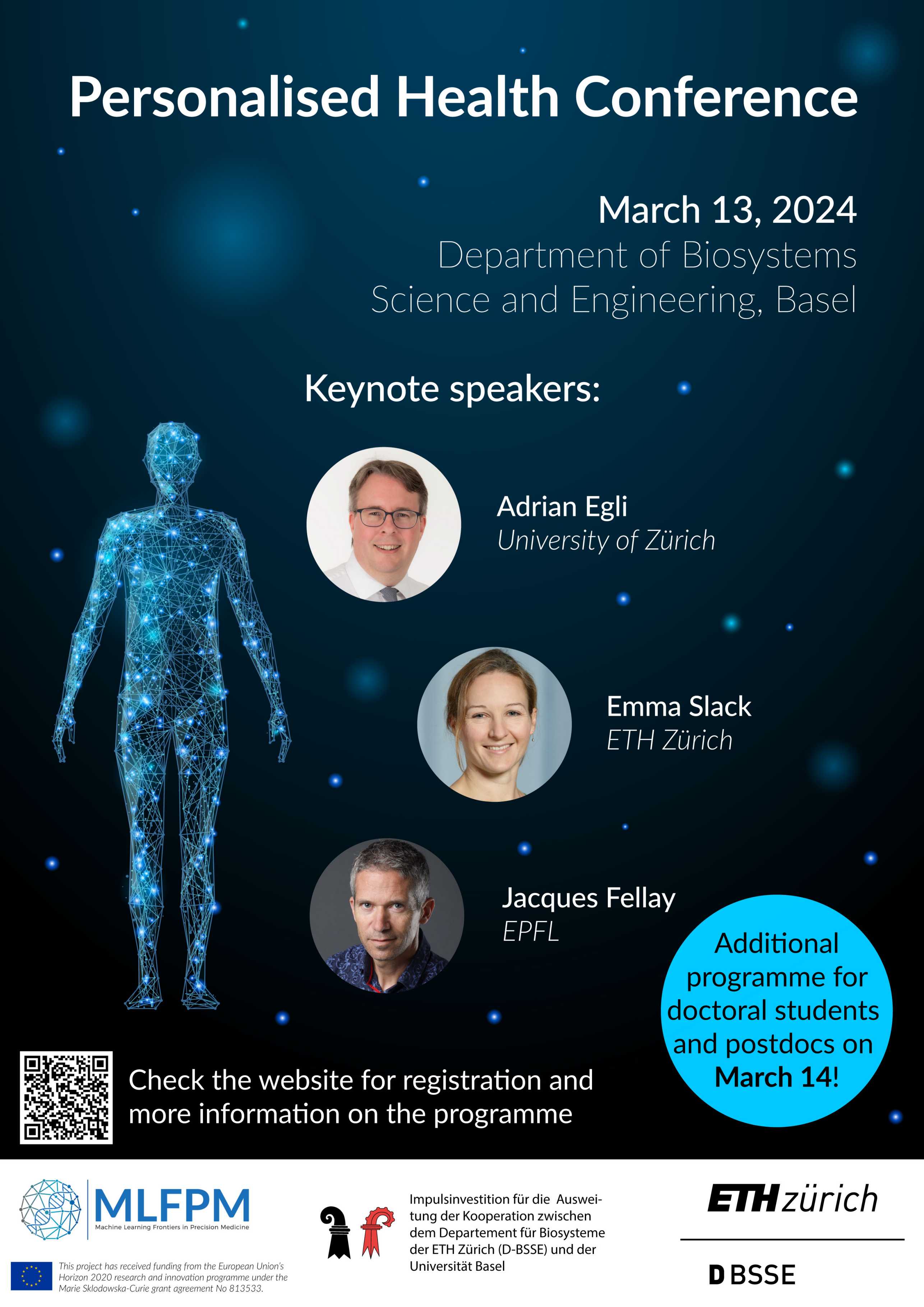Personalised Health Conference 2024

Programme
Day 1 – March 13
Room: E21+E23
Day 2 – March 14
The second day of the event is aimed at early stage researchers (up to postdoc level).
Room: K58 (Elevator from main entrance to K floor)
Abstracts of the talks
Keynote talk: Collecting and using big data to address infections in critical ill patients

Adrian Egli
University of Zürich
In the realm of personalized medicine, the fusion of digitalization and big data has revolutionized our approach to addressing infections in critically ill patients. This keynote lecture delves into the pioneering initiatives of the Swiss Personalized Health Network (SPHN) and the Personalized Health Research Technology (PHRT) programs, particularly spotlighting the transformative impact of the "Personalized Swiss Sepsis Study" and its sequel "National Datastream Infections in ICUs."
Central to our discussion is the strategic organization of resources and collaborations to harness vast datasets, facilitating unparalleled insights into infection management within intensive care units (ICUs). We explore the intricate tapestry of available data, ranging from clinical parameters to genomic profiles, enabling a multifaceted analysis of patient trajectories.
A key focus of our endeavors lies in the quest for digital biomarkers, pivotal in predicting sepsis onset and patient outcomes, including mortality. Through meticulous data interrogation and advanced analytics, we navigate the intricate terrain of critical care infections, unraveling patterns and signals that herald impending crises.
This presentation offers a panoramic view of our journey, elucidating the synergy between personalized medicine, digital innovation, and big data analytics. By illuminating the methodologies and findings of our initiatives, we unveil a paradigm shift in infection management, underscoring the transformative potential of precision medicine in the realm of critical care.
Keynote talk: What role does the immune system play in controlling the intestinal microbiota?

Emma Slack
ETH Zürich
Our guts are home to a complex, dense and dynamic consortia of microbes, which can have a profound impact on our health. How have we evolved to promote species and microbial functions that are beneficial, while minimizing the risk from common opportunistic pathogens such as Salmonella and E.coli? Our work focuses on developing new methods to assess microbiome assembly and function, and to manipulate the abundance and evolution of individual bacterial species in the gut (1, 2). This reveals the potential for oral vaccine-based interventions that may enable more robust prophylaxis of bacterial infections (3), as well as rational microbiota engineering.
- High-avidity IgA protects the intestine by enchaining growing bacteria. Moor K, et al. 2017. Nature 544:498–502 doi:10.1038/nature22058
- Inflammation boosts bacteriophage transfer between Salmonella. Diard M, et al. 2017. Science 355:1211-1215, doi:10.1126/science.aaf8451
- A rationally designed oral vaccine induces immunoglobulin A in the murine gut that directs the evolution of attenuated Salmonella variants.Diard M, et al. Nat Microbiol. 2021 May 27. doi:10.1038/s41564-021-00911-1.
Keynote talk: Translational genomics in infectious diseases

Jacques Fellay
EPFL School of Life Sciences
CHUV Precision Medicine Unit
Swiss Institute of Bioinformatics
Genomic approaches have transformed infectious disease research. The identification of human genetic factors involved in infection susceptibility or disease severity promises advances in two directions: the comprehension of the molecular and cellular mechanisms of disease, and the development of targeted preventive and therapeutic interventions. I will illustrate the progress made in the field over the past decade using our work on HIV and hepatitis viruses. We started with large-scale genotyping and genome-wide association studies, before moving toward rare variant investigation, interrogation of host-pathogen genomic conflicts and, more recently, assessment of polygenic risk scores for complex disease presentations.
About
The event is jointly organised by the Department of Biosystems Science and Engineering of ETH Zurich and the external page Marie Curie Innovative Training Network “Machine Learning Frontiers in Precision Medicine” (MLFPM).
Organising committee
- Niko Beerenwinkel (ETH Zürich)
- Catherine Jutzeler (ETH Zürich)
- Beatrice Beck Schimmer (University of Zürich)
- Ulrike Weber (University of Zürich)
- Andrea Huber Brösamle (ETH Zürich)
- Katharina Heinrich (ETH Zürich)
Sponsors
We thank BSSE, MLFPM, and the "Impulsinvestition für die Ausweitung der Kooperation zwischen dem Departement für Biosysteme der ETH Zürich (D-BSSE) und der Universität Basel" for their support with this event.

Contact
